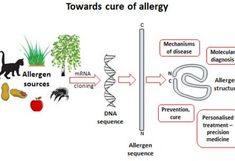Seeds in Space - Cosmic Crops
The International Atomic Energy Agency (IAEA) and the Food and Agriculture Organization of the United Nations (FAO) have sent seeds into space. Read and find more details on following webpage about the project and the idea behind it:
https://www.iaea.org/events/seeds-in-space
"Top cited article" from Institute of Plant Breeding
Within his research project our colleague, Prof. Heinrich Grausgruber, was awarded for his publication "Do modern types of wheat have lower quality for human health?" in the Nutrition Bulletin as
"Top cited aritcle".
Cordially congratulations!
Danube Allergy Research Cluster (Danube ARC) “Towards cure of allergy”
Immunoglobulin E (IgE)-associated allergy is the most prevalent immunologically-mediated disease affecting almost 30% of the population world-wide. In order to develop and evaluate new strategies for allergy diagnosis and early-life prediction as well as for cure and prevention of allergies several research institutions of Lower Austria (Austrian Institute of Technology, AIT; Department of Agrobiotechnology (IFA); Department of Crop Sciences from Campus Tulln; Karl Landsteiner University of Health Sciences at the locations Krems, St. Pölten and Tulln) have teamed up with the Medical University of Vienna to form the Danube Allergy Research Cluster. This research project is based on insights gained from the previous FWF-funded Allergy Research Program.
Wheat and soy represent not only some of the most important plant foods, but also represent common allergen sources containing potent inhalant and food allergens. This subproject aims to identify hypoallergenic wheat and soy species, which lack or contain lower levels of allergens, but preserve their nutritional value and can be easily cultured. Allergic potential of different wheat species and soy variants will be screened with IgE antibodies of allergic patients and in basophil activation tests. It is envisaged that planting and utilization of hypoallergenic wheat and soy will reduce the frequencies of allergic sensitization to food allergens and thus contribute to allergy prevention. Previous publications of the Institute of Plant Breeding provide a basis for this research:
- Call et al., J CEREAL SCI. 2020; 93, 102974 (https://forschung.boku.ac.at/fis/suchen.publikationen_uni_autoren?sprache_in=de&menue_id_in=102&id_in=&publikation_id_in=132552)
- Call et al., Food Chem. 2019; 299:125038 (https://forschung.boku.ac.at/fis/suchen.publikationen_uni_autoren?sprache_in=de&menue_id_in=102&id_in=&publikation_id_in=126906)
- Watanabe et al., J Sci Food Agric. 2017; 97(3): 1010-1017 (https://forschung.boku.ac.at/fis/suchen.publikationen_uni_autoren?sprache_in=de&menue_id_in=102&id_in=&publikation_id_in=104869)
The PhD students who will work in this research project will be trained according to the rules of the International PhD Program “Molecular, Cellular and Clinical Allergology” MCCA.


